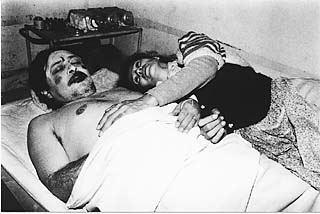'Art Should Be Convulsive'
The films of Arturo Ripstein
By Marjorie Baumgarten, Fri., March 7, 2003

Mexico's most renowned and prolific contemporary filmmaker is, most likely, someone you've never heard of: Arturo Ripstein. The Austin Film Society seeks to correct this oversight with their upcoming series "Journeys Into the Shadows: The Films of Arturo Ripstein."
Ripstein has made nearly 30 feature-length films since his first movie in 1966, Tiempo de Morir (A Time to Die), a Western whose screenplay was written by Carlos Fuentes and Gabriel García Márquez. The film's formal experimentation and critique of masculinity set Ripstein's work apart from the bulk of movies that were being produced in Mexico at that time. Mexico had gone from its golden age of cinema in the 1940s and 1950s -- a time during which the country's film industry produced more than 100 movies a year -- to a radical diminishment of output in the Sixties and later decades, to a point which only a handful of Mexican-produced movies were made every year.
At the age of 15, Ripstein decided that he wanted to become a director, and after his father, a movie producer, took him to a screening of Luis Buñuel's morally explosive Nazarín (1958), he became more determined than ever. In a Film Quarterly interview with Sergio de la Mora in 1999, Ripstein describes how he approached Buñuel, whom he already knew through his father. "I went to see Buñuel at his house a few days after I saw Nazarín. I had made up my mind that I wanted to be a director. I told him, 'I saw your film, and I want to be a director just like you, and I want you to take care of me. ...' At that point he slammed the gate in my face. I was quite stunned. A couple of minutes later he opened the gate again and said, 'OK, come in.' So he took me into his living room, and he mounted a small 16mm projector and he showed me Un Chien Andalou (1928), twice. He said, 'These are the kind of films I make. Do you still want to be a director?' I said, 'More than ever.' He was gracious enough to take me under his wing." Ripstein served as an unbilled assistant to Buñuel during the filming of The Exterminating Angel (1962).
Ripstein's films challenge Mexican and Hollywood conventions, making him a controversial figure in the Latin American film world. He often exploits Mexico's melodramatic format of the telenovela, as well as other entrenched generic traditions. His world is populated by outsiders -- prostitutes, homosexuals, Jews, bohemians, gigolos, the impoverished, and so on. Increasingly, throughout his career Ripstein has become a master of the long take, which, along with his fondness for mirror imagery, augments the sense of scrutiny with which he observes his subjects.
In 1985, Ripstein first partnered with Paz Alicia Garciadiego, who wrote the screenplay for El Imperio de la Fortuna (The Realm of Fortune). Garciadiego has scripted all of Ripstein's subsequent films and has also partnered with him in marriage. In that same Film Quarterly article, de la Mora describes Ripstein's maturation process. "Ripstein's early films focused on authoritarian, ineffective, or absent patriarchs: since embarking on a partnership with the screenwriter Paz Alicia Garciadiego ... Ripstein has turned his attention to mothers. ... Deliberately working against a long tradition of celebrating and idealizing the family, and specifically paternal and maternal figures, he examines authoritarian family structures, machismo, homophobia, and other forms of intolerance. His elegant, visceral, and ferociously cathartic films follow his dictum that 'art should be convulsive.'" ![]()
Journeys Into the Shadows
SXSW screenings at Westgate (South Lamar and Ben White):
El Imperio de la Fortuna/The Empire of Fortune (1986): March 7, 7:30pm; March 9, 4:30pm; March 13, 4:45pm
El Evangelio de las Maravillas/Divine (1998): March 8, 7:30pm*; March 10, 4:30pm; March 15, 1:30pm
La Perdición de los Hombres/Man's Downfall (2000): March 9, 7:30pm*; March 11, 7pm; March 14, 3pm * Filmmakers present at screening
Free AFS screenings, Tuesdays, 7pm, at Alamo Drafthouse Downtown (409 Colorado):
March 18: La Reina de la Noche/Queen of the Night (1994)
March 25: Así Es la Vida/Such Is Life (2000)
April 1: Principio y Fin/The Beginning and the End (1993)
April 8: Profundo Carmesí/Deep Crimson (1996)
The first three titles in the series will screen during the next week at Westgate as part of the SXSW Film Festival, while the remaining four films in the series will be shown during weekly screenings at the Alamo Drafthouse Downtown through April 8. The series is co-sponsored by Cine Las Americas Media Arts Center and the Four Seasons Hotel.












